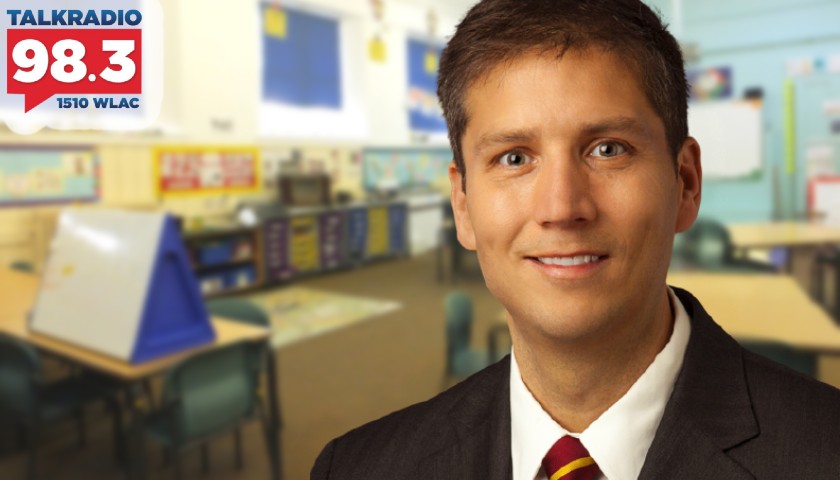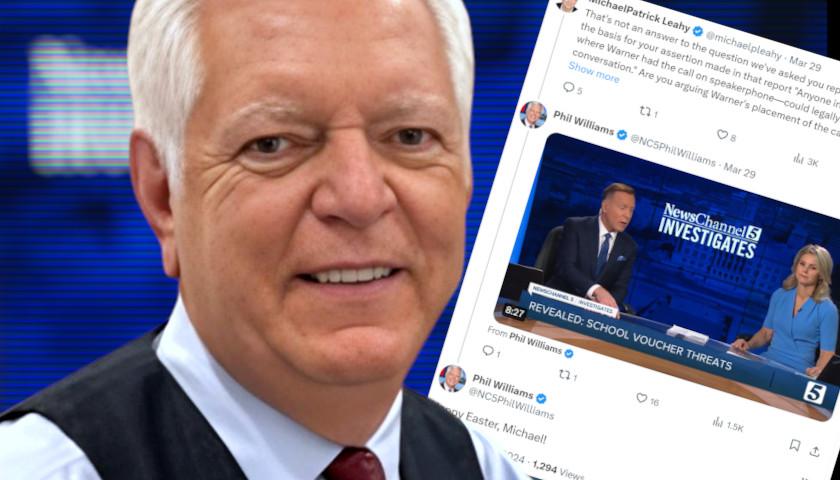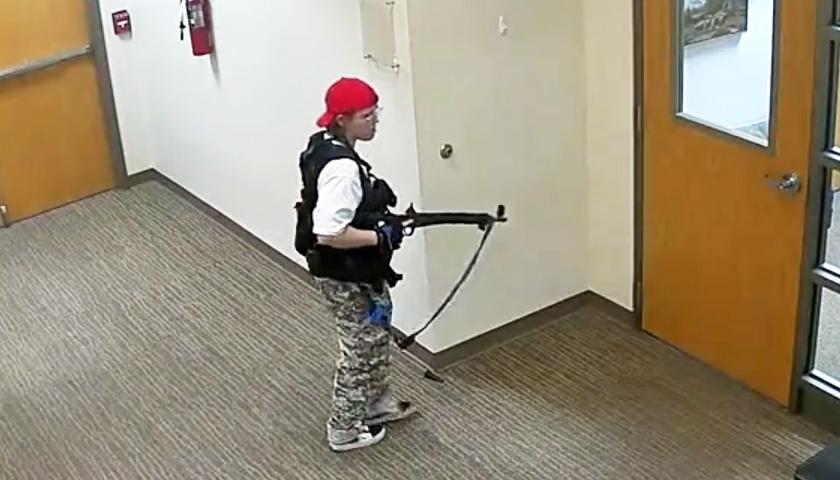Live from Music Row Thursday morning on The Tennessee Star Report with Michael Patrick Leahy – broadcast on Nashville’s Talk Radio 98.3 and 1510 WLAC weekdays from 5:00 a.m. to 8:00 a.m. – host Leahy welcomed Southeastern Legal Foundation’s Director of Litigation Braden Boucek to the newsmakers line to discuss the antiracist training lawsuit filed with the Evanston-Skokie school district in Illinois.
Leahy: We are joined on our newsmaker line by our good friend, Braden Bosek, who is a director of litigation at the Southeastern Legal Foundation. Good morning, Braden.
Boucek: Good morning, Michael. A pleasure to be on.
Leahy: Well, when last we spoke, you were affiliated with The Beacon Center here in Tennessee. Now you’re the director of litigation at the Southeastern Legal Foundation down in Atlanta. Boy, do you have a case on your hands?
Boucek: We sure do. Yep. It’s been exciting.
Leahy: I read the outline of the allegations there and I’m gonna call these allegations “incredible.” That is hard to believe, not credible, that a school system would do what is included in these allegations.
I just go down the list of all the things that this White teacher in the Evanston-Skokie school district in Illinois says he’s being required to do. I mean, it’s a lot of stuff. He’s got to participate in antiracist training as evidenced by the lawsuit.
The training instructs teachers to accept that White individuals “loud, authoritative, and controlling.” Understand that being “less White.” “Less racially oppressive.”
Acknowledge that “White identity is inherently racist.” Denounce “White privilege and participate in, ‘privilege walks’ where they must stand in line and separate themselves according to statements relating to their race or color.” They aren’t really doing that in that district, are they, Braden?
Boucek: That’s exactly what they’re doing in the district. And you don’t have to take our word for it. It’s all based on documents that they publicly proclaim. It’s in their lesson plans.
It’s on their district’s equity glossary, which is on their website, and it’s in their vision statements. So they have bought in hook line and sinker into an antiracist training and they’ll publicly shout it from there after that.
Leahy: Again, I guess the word is incredible. I can’t believe it. It is so racist against this White teacher. What kind of reaction have you received after you filed this? And would you file this in federal district court? Where did you file the case?
Boucek: We filed this in federal district court in Chicago. And obviously, everybody is concerned about the sort of woke curriculum that you see here in Tennessee or in some of these other schools.
And what’s happening in Chicago is what happens when the woke curriculum that we see in Tennessee is allowed to grow up and bear fruit. And it was only a matter of time. But we’ve got to get these things before federal judges. We’ve got to allege the equal protection violation in the Civil Rights Act, and we’ve got to stop these things.
Leahy: Evanston-Skokie, isn’t Evanston a fairly affluent suburb of Chicago?
Boucek: Yeah, that’s my understanding as well. But this is an ideology that draws a certain type of progressive intellectual, and they find it irresistible. And District 65 has bought into it hook line sinker.
Leahy: The officials there are Devin Horton, who’s the Superintendent of the Evanston-Skokie school district. Latarsha Green, who is the Deputy Superintendent of District 65, and then Stacey Beardsley, who is the Assistant Superintendent of curriculum and instruction.
All three of those officials are part of the staff that put this together. And then there’s a Board of Education, right? Did the board actually approve this stuff?
Boucek: Oh, yes. This is a board-approved curriculum. And I’d invite anybody to go to our website if they want to actually see a list of these things because as you pointed out, they really just have to be read to be believed.
And you can go to Slfliberty.org, which is our website, and look for our coverage on this. Our complaint is there, which is the actual formal legal document that we filed. And in the third paragraph, we have an image from a book.
Leahy: I’m looking at it right now. (Chuckles) Describe it.
Boucek: The book from PreK. Well, the book is called Not My Idea: A Book About Whiteness. And the image that you’re looking at that we put so prominently, no complaint is a picture of a White devil holding up a contract for stolen land and stolen property. And all you got to do is exchange your soul.
And the caption, says, “Whiteness is a bad deal and it always has been.” And again, that’s in the curriculum. And that’s shown to kids as young as Pre-K.
Leahy: I’m looking at it. Item three in your litigation in your complaint says what Superintendent Devin Horton means by ‘antiracist’ looks like the following image from a lesson taught to District 65 elementary school students.
And on one side of the page, it says, highlighted in red, Whiteness is a bad deal. It always was. And then it’s got one of these little air bubbles where it’s written in ‘dude, we can see your pointy tail.’
This is given to elementary school students. And then on the other page, it’s this White devil with a pointy red tail. And then it looks like a receipt with money on it. And it says, contract binding you to Whiteness.
You get stolen land, stolen riches, special favor. Whiteness gets to mess endlessly with the lives of your friends, neighbors, loved ones, and all fellow humans of color. Your soul, sign below.
Land riches and favors may be revoked at any time for any reason. This is what they’re teaching elementary schools in the Evanston-Skokie School District an affluent suburb of Chicago. How long have they been doing that?
Boucek: At least since 2017. And you’ve described in great detail what the curriculum looks like. But what it really is is it’s teaching non-White kids to hate. And it’s teaching White kids to hate themselves.
And all of it is unconstitutional. We’ve been through this before. There is a robust body of law about treating school children differently on the basis of race.
Leahy: You said something very significant. Our schools, at least this school system is teaching White children to hate themselves. We’ve seen a lot of reports here in Williamson County.
There’s a group I’m sure you’re familiar with them called Moms for Liberty. And they have brought in parents talking about their children who are upset with their own history. I think some even mentioned the kids were almost suicidal, didn’t want to go to school. It’s a terrible, terrible thing. It’s child abuse, in my view.
Boucek: It’s a dangerously destructive ideology. And I know the stories you’re talking about in Williamson County about the child of biracial parents that came home and said she didn’t want to be White anymore.
It promotes a view of race essentialism that lumps us all into various categories and then pits us all against each other. Oppressor or oppressed. And that just has no business in the school, whether in Tennessee or Chicago.
Leahy: It is, in fact, the antithesis of the American character of individualism and self-reliance, and respect for other people. You’ve got in your complaint, I think an excellent description of the difference between equity, which is all the rage these days among the elite, and equality.
Let me just read this and get your reaction. You say in the complaint, equity is very different than equality. Although the two are sometimes confused. Equality is a principle proclaimed in the Declaration of Independence, defended in the Civil War, and codified into law through the fourteenth and fifteenth amendments to the Constitution, the Civil Rights Act of 1964, and the Voting Rights Act of 1965. As District 65 in Evanston-Skokie, Illinois itself has recognized, equality is about sameness in treating everyone in an identical manner regardless of their race.
Equity is about so-called justice and individuals getting what “they need and deserve.” Said another way, equality strives for equal opportunity while equity strives for equal outcomes. How did equity replace equality?
Boucek: That’s exactly what’s going on is that they’re trying to swap out equality with equity. And we thought it was very important that we pull up these terms so people become familiar with them because equity is becoming a buzzword that’s being kicked around with a great deal of promiscuity these days.
And it’s an innocuous-sounding term. It’s even a noble goal. But the problem is, However desirable, equity, maybe equality is a non-negotiable constitutional command. Of all of the American freedoms, the self-evident truth that all men are created equal is the one that we have fought and bled for more than any other one. And I’m thinking about Valley Forge. I
‘m thinking about the blood-soaked fields of Antietam. I’m thinking about Marines rating across a coral reef and Tarawa. And I’m thinking about the Edmund Pettus Bridge. We have fought so long and hard to live up to the standard that all men are created equal based on race.
We just can’t and have afforded any kind of backsliding now. And that’s really what happens starting in 2017. They just decided we can’t wait anymore, we need to go ahead and tilt the scales to get to equity now.
But everybody needs to know what equity means. Equity is not equality. Equity is a license to punish Americans for their skin color. And it’s precisely why the Civil Rights Movement existed in the first place.
Leahy: Braden Boucek with the Southeastern Legal Foundation. Can you stick with us through the break? We’ll have more when we get back.
Boucek: Absolutely.
Listen to the first hour here:
– – –
Tune in weekdays from 5:00 – 8:00 a.m. to the Tennessee Star Report with Michael Patrick Leahy on Talk Radio 98.3 FM WLAC 1510. Listen online at iHeart Radio.
Photo “Braden Boucek” by The Federalist Society. Background Photo “Classroom” by Educators .co.uk. CC BY 2.0.




